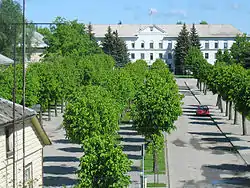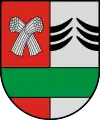Šakiai
Šakiai (![]() pronunciation , Polish: Szaki) is a city in the Marijampolė County, Lithuania. It is located 65 km (40 mi) west of Kaunas. It is presumed that Šakiai first expanded from Šakaičai village. By 1719 a church in Šakiai was built. By the 19th century Šakiai already had city rights; it also had a school, Catholic and Lutheran churches, a synagogue, and a post office. During World War II the city was destroyed by the German army.
pronunciation , Polish: Szaki) is a city in the Marijampolė County, Lithuania. It is located 65 km (40 mi) west of Kaunas. It is presumed that Šakiai first expanded from Šakaičai village. By 1719 a church in Šakiai was built. By the 19th century Šakiai already had city rights; it also had a school, Catholic and Lutheran churches, a synagogue, and a post office. During World War II the city was destroyed by the German army.
Šakiai | |
|---|---|
Town | |
 Aerial view of Šakiai, featuring the town hall | |
 Coat of arms | |
 Šakiai Location of Šakiai | |
| Coordinates: 54°57′N 23°3′E | |
| Country | |
| Ethnographic region | Suvalkija |
| County | |
| Municipality | Šakiai district municipality |
| Eldership | Šakiai eldership |
| Capital of | Šakiai district municipality Šakiai eldership |
| First mentioned | 1599 |
| Granted city rights | 1776 |
| Government | |
| • Mayor | Edgaras Pilypaitis (LKDP) |
| Population (2020) | |
| • Total | 4,998 |
| Time zone | UTC+2 (EET) |
| • Summer (DST) | UTC+3 (EEST) |
History
Šakiai is the birthplace of early Zionist philanthropist Isaac Leib Goldberg in 1860.[1]
Several massacres of Jewish people are alleged to have taken place in Šakiai in World War II, from July to September 1941. The killings are alleged to have committed by an Einsatzgruppen of German SS troops. The involvement of a small number of Lithuanians is also alleged.[2]
In 1921, Zygmunt Kęstowicz, a Polish actor, was born in the town.
Gallery
 Town hall of Šakiai
Town hall of Šakiai Church of John the Baptist
Church of John the Baptist Šakiai Evangelical Lutheran Church
Šakiai Evangelical Lutheran Church Bust of Vincas Kudirka in Šakiai
Bust of Vincas Kudirka in Šakiai
References
| Wikimedia Commons has media related to Šakiai. |
- Slutsky, Yehuda. "Sakiai". Jewish Virtual Library. American-Israeli Cooperative Enterprise. Retrieved 2015-01-12.
Anne Blejer, Hatte (2013-03-04). "Yitzchak Leib Goldberg". Geni. MyHeritage. Retrieved 2015-01-10. - http://www.holocaustatlas.lt/EN/#a_atlas/search/vcntfr=1000.vcntto=5000/page/4/item/211/
